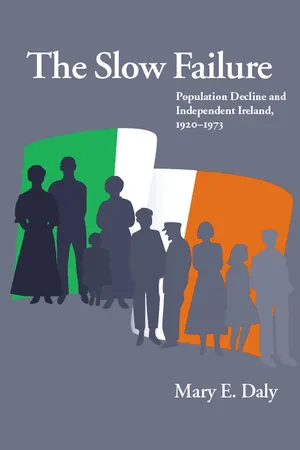
- 454 pages
- English
- PDF
- Available on iOS & Android
About this book
Today Ireland's population is rising, immigration outpaces emigration, most families have two or at most three children, and full-time farmers are in steady decline. But the opposite was true for more than a century, from the great famine of the 1840s until the 1960s. Between 1922 and 1966—most of the first fifty years after independence—the population of Ireland was falling, in the 1950s as rapidly as in the 1880s. Mary Daly's The Slow Failure examines not just the reasons for the decline, but the responses to it by politicians, academics, journalists, churchmen, and others who publicly agonized over their nation's "slow failure." Eager to reverse population decline but fearful that economic development would undermine Irish national identity, they fashioned statistical evidence to support ultimately fruitless policies to encourage large, rural farm families. Focusing on both Irish government and society, Daly places Ireland's population history in the mainstream history of independent Ireland.
Daly's research reveals how pastoral visions of an ideal Ireland made it virtually impossible to reverse the fall in population. Promoting large families, for example, contributed to late marriages, actually slowing population growth further. The crucial issue of emigration failed to attract serious government attention except during World War II; successive Irish governments refused to provide welfare services for emigrants, leaving that role to the Catholic Church. Daly takes these and other elements of an often-sad story, weaving them into essential reading for understanding modern Irish history
Frequently asked questions
- Essential is ideal for learners and professionals who enjoy exploring a wide range of subjects. Access the Essential Library with 800,000+ trusted titles and best-sellers across business, personal growth, and the humanities. Includes unlimited reading time and Standard Read Aloud voice.
- Complete: Perfect for advanced learners and researchers needing full, unrestricted access. Unlock 1.4M+ books across hundreds of subjects, including academic and specialized titles. The Complete Plan also includes advanced features like Premium Read Aloud and Research Assistant.
Please note we cannot support devices running on iOS 13 and Android 7 or earlier. Learn more about using the app.
Information
Table of contents
- Contents
- List of Tables
- Acknowledgments
- List of Abbreviations
- 1. The Pathology of Irish Demographic History
- 2. Saving Rural Ireland: 1920–1960
- 3. Marriages, Births, and Fertility: The Irish Family
- 4. The Irish State and Its Emigrants: 1922–1954
- 5. The Vanishing Irish: 1954 –1961
- 6. 1961–1971: “A Worthy Homeland forthe Irish People”?
- 7. “A Ticket to London Is a Ticket to Hell” : Emigrants, Emigrant Welfare, and Images of Ireland
- Statistical Appendix
- Notes
- Bibliography
- Index